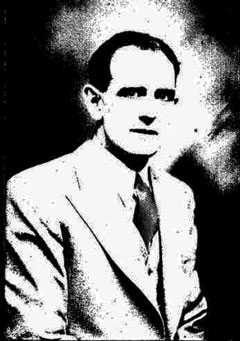Second Lieutenant John Irwin

John Irwin (or Erwin) was born on 28 November 1896 at Aughnacloy, Clogher, County Tyrone, the seventh of thirteen children of colporteur (book seller) John Erwin and his wife Jane (née Rainey). Educated at the Enniskillen Model School, at the time of the 1911 Census he was living at Corralinnen, Enniskillen Rural, with his parents and five of his ten surviving siblings.
Irwin enlisted in the 6th (Inniskilling) Dragoons Service Squadron at Enniskillen on 9 October 1914 (No. UD/38 – later Corps of Dragoons No. D/21225). He recorded his occupation at the time as 'assistant grocer'.
On 6 October 1915 he embarked for France with his squadron, which was then serving as divisional cavalry to the 36th (Ulster) Division.
On 2 May 1916 Irwin and three other men of the squadron were sent to the 36th Divisional Signal Company for a course in visual signalling.
In June 1916 the Inniskilling squadron joined with C and F Squadrons of the North Irish Horse to form the 2nd North Irish Horse Regiment, serving as corps cavalry to X Corps. In August-September 1917 the regiment was disbanded and its men were transferred to the infantry.
Irwin, however, had applied for a commission on 21 August 1917. He left France on 24 September and on 7 December reported for duty at the No.16 Officer Cadet Battallion at Rhyl in Wales. Five months later he was reported as having a 'satisfactory' standard of education, an 'average' military knowledge and power of command and leadership, with special skills in riding and signalling. "Should make an efficient Platoon Commander."
On 29 May 1918 Irwin was commissioned as a second lieutenant. Although he had expressed a preference for the Royal Inniskilling Fusiliers, the Royal Dublin Fusiliers or the Leinster Regiment, he was posted to the 5th (Reserve) Battalion, Worcestershire Regiment, based at the time at Harwich, Essex.
On 7 November 1918 a letter written by Irwin to the father of a recently deceased pal, Harold Irvine, was published in the Fermanagh Times. He wrote:
He and I were together in France and at home, and it grieved me to hear of his death. As a brother soldier and as a chum, I could not let the occasion pass without expressing my sympathy with you when I heard of his death.
Irwin was released from military duty on 8 October 1919 and relinquished his commission on 1 September 1921.
In the 1920s he emigrated to the United States. He died at Portland, Oregon, on 3 January 1966.
At least two of Irwin's brothers also served in the war – George in the Royal Air Force and Joseph in the Royal Engineers.
Image sourced from Ancestry.com Public Member Trees – contributor 'VLynneCummings'.
This page last updated 3 February 2023.
